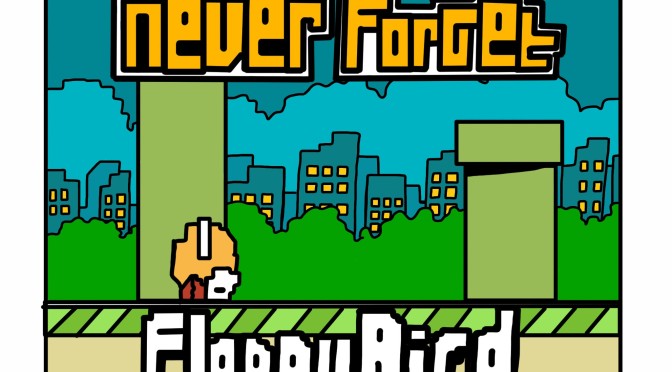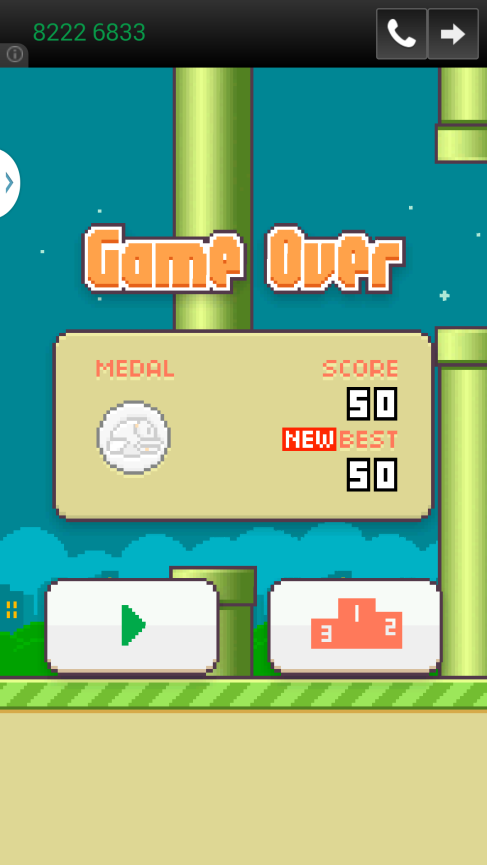This is old news. If you haven’t heard, an insanely addictive game going by the name of “Flappy Bird” swept through the world over the last year. Rumour has it that it garnered over 50 million downloads across both the App and Google Play stores. The game was so successful, that it began raking in $50,000 per day for its developer.
Yet early this week, its developer decided to pull the plug on it. News has it that the game became so popular… because it looked so simple, and yet was so difficult to play, made it exceedingly addictive to play.
I should know. I played it too – two days before it was taken down.
Since my acquaintance with the game, I’ve come across a wide array of people people who’ve celebrated as well as condemned it. I can see and appreciate both perspectives – and I refuse to be drawn into taking sides.
Why?
It’s because I see the value behind the game, and have drawn important life lessons from it. Here are my top five:
#1 Flappy Bird Teaches You the Value of Persistence
I’ll admit… the game has probably ‘stolen’ up to four hours of my life. On a late Saturday night out with my buds to catch a football match on TV – all it took was for one of us (okay… me) to download the game. Before we knew it, all the mobile devices had flappy bird on it… and we spent close to two hours on the game… and by game, I didn’t mean the football match.
For close to two hours, the five of us us strived to outdo each other in high scores department. There were moans, groans and lots of swearing each time ‘flappy’ died.
Did we give up?
No.
I’m no super high scorer, really. In fact, I’m not keen to get into triple digits just for the sake of it.
Instead, I recognize that through persistence and practice, we get better at some thing we put our minds to… and that makes a difference.
Lesson: Persistence matters.
Lesson #2: Practice is Only Half the Story
Instead, our scores got higher. The few of us who banded together even shared learning ‘secrets’ to outdo “the other”.
I’ll admit, my progress was really slow. But until my pair of buds decided to let me in on a little secret of theirs (they were the top two scorers) I was close to the bottom… constantly frustrated and annoyed by another irritating friend of mind.
One simple little tip later, I doubled my score and I became the annoying bugger baying for blood.
Lesson: Practice doesn’t make perfect if you don’t know what to do.
The same goes to the many things we aim to do in life. We can spend hours practicing… but until you know what to do, you might not be doing it right.
#3 It’s ‘Fun’ When You See it as a Challenge
I use open inverted commas here because I know some people will disagree.
I understand the game can be is incredibly frustrating. The curious question however, how did so many of us get addicted to it?
I believe the secret lies in seeing it as a challenge.
We believe that we can do it – and so we put our hearts, minds and souls into doing better each round.
The result (after many hours) is that there will be results – because we’ve invested time, effort and thought into it… and witnessing progress can be really gratifying and addictive.
Lesson: Our our personal development journey can be so so much more gratifying once we start looking at it as a challenging game.
#4 It You Get the Hang Of It After Awhile
I’m going to admit that I kept crashing into the pipes, I struggled to get pass the 10th point on several occasions (to put it nicely).
Looking back, I realized my rhythm was off and I struggled with my timing to ‘tap’. That’s, in comparison to how I approach the game now.
I realized I can easily get beyond the 30-40 mark now without actively thinking about when to tap. I’ve worked up a rhythm… a routine on when to tap so that I do not crash and navigate through the maze almost seamlessly.
Lesson: Like most skills in life, practice makes progress. Once you commit the process to the sub-conscious level, you don’t have to actively think about it any more… and that makes working the skill so much easier.
Think of how you learned to ride the bicycle, drive or swim – the process is similar.
# 5 It’s All About Focus
Again, I’ve another admission: I struggled with my ability to focus my attention on the game when I first started. Mainly because there were so many things going through my mind.
Yet through consistent practice (trials, to be exact), the process took effective and my mind became conditioned with the routine. Like #4 – I don’t have to actively think about what I need to do any more, my hands get the job done, and I’m able to block out distractions that render me ineffective.
In a related article, I’ve read about how so many people have written extremely critical letters to the game creator blaming him for their addiction. I find it ironic… because (I feel that) the game has taught me how to cure my own addiction to distractions.
It’s for that reason I’m comfortable and able to put my phone down to pen this article.
Lesson: A key to getting things done is the ability to focus. The ability to “focus” is a skill – and by that definition it can be honed.
Don’t blame your addiction / inability to focus on somebody else. The buck stops with you.
Summary:
Too many people give up, not due to of a lack of knowledge, but due to a lack of commitment… due to a lack of belief – either in the outcome, or the effort they’re putting in.
The key however, is recognizing that time, thought and effort do pay off as long as we we’re willing to acknowledge the progress we’re making, and continue to push our boundaries.
The fact that we are willing to put up with such an incredibly frustrating game… and push our boundaries on it… is enough proof that as long as we put our minds to something, we can become better at it.
The same principle applies to confidence building, relationships and public speaking.
As the saying goes, it’s mind over matter. If you don’t mind it, it doesn’t matter.

